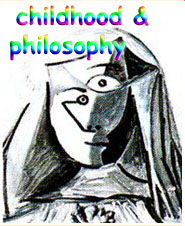ecosocial citizenship education: facilitating interconnective, deliberative practice and corrective methodology for epistemic accountability
DOI:
https://doi.org/10.12957/childphilo.2019.42794Keywords:
ecosocial citizenship, cultural citizenship, epistemic accountability, democratic correctiveness, epistemic violenceAbstract
According to Val Plumwood (1995), liberal-democracy is an authoritarian political system that protects privilege but fails to protect nature. A major obstacle, she says, is radical inequality, which has become increasingly far-reaching under liberal-democracy; an indicator of ‘the capacity of its privileged groups to distribute social goods upwards and to create rigidities which hinder the democratic correctiveness of social institutions’ (p. 134). This cautionary tale has repercussions for education, especially civics and citizenship education. To address this, we explore the potential of what Gerard Delanty calls ‘cultural citizenship’ as an alternative to the disciplinary citizenship that permeates Western liberal discourse. Cultural citizenship emphasises citizenship as communication and continual learning processes, rejecting the idea of citizenship as a fixed set of cultural ideals, norms or values defined and enforced by liberal society’s legal, political and cultural institutions, including education and ‘citizenship training’. However, we contend that a critical first step, essential to democratic correctiveness, is to clear away obstacles created by the privileging of a dominant epistemic position. We conclude that Plumwood’s philosophy alongside John Dewey’s work on democracy and education provide a theoretical framework for effective democratic inquiry aimed towards interconnective, deliberative practice and corrective methodology for epistemic accountability.
References
Bleazby, J. (2015). Why some school subjects have a higher status than others: The epistemology of the traditional curriculum hierarchy. Oxford Review of Education, 41(5), 671–689.
Burgh, G. (2010). Citizenship as a learning process: Democratic education without foundationalism. In D.R.J. Macer & S. Saad-Zoy (Eds.), Asian-Arab philosophical dialogues on globalization, democracy and human rights (pp. 59–69). Bangkok: UNESCO, Regional Unit for Social and Human Sciences in Asia and the Pacific.
Burgh, G. (2014). Democratic pedagogy. Journal of Philosophy in Schools, 1(1), 22–44.
Burgh, G., & Thornton, S. (2017). The democratic habitat: Promoting peace education. Refereed paper presented at Philosophical Inquiry with Children: Family resemblances, XVIII International Council for Philosophical Inquiry with Children (ICPIC) Conference, Formación del Profesorado Faculty, Cantoblanco campus, Universidad Autonoma de Madrid, Spain (pp. 1–19). 28 June–1 July 2017.
Burgh, G., Field, T., & Freakley, M. (2006). Ethics and the community of inquiry: Education for deliberative democracy. South Melbourne: Thomson.
Cam, P. (2000). Philosophy, democracy and education: Reconstructing Dewey. In I-S Cha (Ed.), Teaching philosophy for democracy (pp. 158–181). Seoul: Seoul University Press.
Clarke, J., Coll, K., Dagnino, E., & Neveu, C. (2014). Recentering citizenship. Disputing citizenship (pp. 9–56). Bristol: Policy Press.
Delanty, G. (2000). Citizenship in a global age: Society, culture, politics. Philadelphia: Open University Press.
Delanty, G. (2003). Citizenship as a learning process: Disciplinary citizenship versus cultural citizenship. International Journal of Lifelong Education, 22(6), 597–605.
Dewey, J. (1916). Democracy and education: An introduction to the philosophy of education. New York: Free Press/Macmillan.
Fricker, M. (2007). Epistemic injustice power and the ethics of knowing. Oxford; New York: Oxford University Press.
Godden, L. (2012). Native title and ecology: Agreement-making in an era of market Environmentalism. In J.K. Weir (Ed.), Country, native title and ecology (pp. 105–134). ACT: ANU E Press and Aboriginal History Incorporated.
Graham, M. (1999). Some thoughts about philosophical underpinnings of Aboriginal world views. Worldviews: Global Religions, Culture and Ecology, 3(2), 105–118.
Kapai, P. (2012). Developing capacities for inclusive citizenship in multicultural societies: The role of deliberative theory and citizenship education. Public Organization Review: A Global Journal, 12(3), 277–298.
Leopold, A., (2013). A sand county almanac & other writings on ecology & conservation (Library of America ; 238). New York: Library Of America.
Lloyd, G. (2000). No one’s land: Australia and the philosophical imagination. Hypatia, 15(2), 26–39.
Mathews, F. (1996). Ecology and democracy. Portland: Frank Cass.
Moreton–Robinson, A. (2015). The white possessive: Property, power, and indigenous sovereignty. Minneapolis: University of Minnesota Pressp
Nakata, N.M., Nakata, V., Keech, S., & Bolt, R. (2012). Decolonial goals and pedagogies for indigenous studies. Decolonization: Indigeneity, education & society, 1(1), 120–140.
Olsson, L., Opondo, M., Tschakert, P., Agrawal, A., Eriksen, S.H., Ma, S., Perch, L.N., & Zakieldeen, S.A. (2014). Livelihoods and poverty. In C.B. Field, V.R. Barros, D.J. Dokken, K.J. Mach, M.D. Mastrandrea, T.E. Bilir, M. Chatterjee, K.L. Ebi, Y.O. Estrada, R.C. Genova, B. Girma, E.S. Kissel, A.N. Levy, S. MacCracken, P.R. Mastrandrea & L.L. White (Eds.), Climate Change 2014: Impacts, Adaptation, and Vulnerability. Part A: Global and Sectoral Aspects. Contribution of Working Group II to the Fifth Assessment Report of the Intergovernmental Panel on Climate Change (pp. 793–832). Cambridge; New York: Cambridge University Press.
Plumwood, V. (1995). Has democracy failed ecology? An ecofeminist perspective. Environmental Politics, 4(4), 134–168.
Plumwood, V. (2002). The Ecological Crisis of Reason. London; New York: Routledge.
Routley, R. (1973). Is there a need for a new, an environmental, ethic? Proceedings of the XVth World Congress of Philosophy, Varna, Bulgaria, 17–22 September (pp. 205–210). Varna: Sofia Press.
Shor, I., & Freire, P. (1987). A pedagogy for liberation. South Hadley: Bergin & Garvey Publishers.
Smith, L.T. (2012). Decolonizing methodologies: Research and indigenous peoples, second edition. London: Zed Books.
Smith, L.T., Tuck, E., & Yang, W. (Eds.) (2019). Indigenous and decolonizing studies in education: Mapping the long view (pp. 1–24). New York: Routledge.
Spivak, G.C. (2003). Can the subaltern speak? Die Philosophin, 14(27), 42–58.
Thornton, S., & Burgh, G. (2017). Making peace education everyone’s business. In C–C. Lin & L. Sequeira (Eds.), Inclusion, diversity and intercultural dialogue in young people’s philosophical inquiry (pp. 55–65). Rotterdam: Sense Publishers.
Thornton, S., & Burgh, G. (2019). Growing up with philosophy in Australia: Philosophy as cultural discourse. In G. Burgh & S. Thornton (Eds.), Philosophical Inquiry with Children: The development of an inquiring society in Australia (pp. 335–249). Abingdon: Routledge.
Watson, I. (2011). Aboriginal(ising) international law and other centres of power. Griffith Law Review, 20(3), 619–640.
Watson, I. (2014). Re-centring first nations knowledge and places in a Terra Nullius space. AlterNative: An International Journal of Indigenous Peoples, 10(5), 508–520.
Wolfe, P. (2006). Settler colonialism and the elimination of the native. Journal of Genocide Research, 8(4), 387–409.




